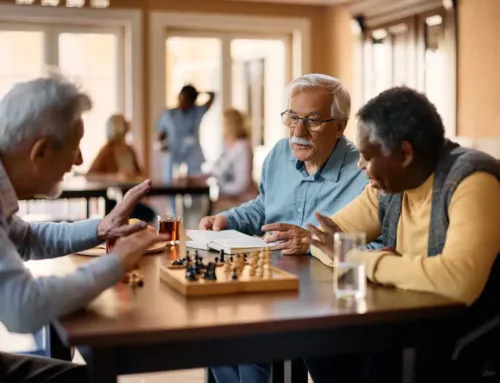
Moving to a residential assisted living community with a memory care program is often a wonderful, positive step for seniors with dementia, one that offers access to 24/7 specialist support, enriching activities that support cognitive health, nutritious meals, and adapted facilities. Residential memory care can vastly improve the physical, mental, and emotional health of seniors with dementia and family caregivers.
But even in 2023, myths surrounding dementia and residential memory care are still prevalent. Unfortunately, these misconceptions make some family caregivers reluctant to consider assisted living options when a loved one receives a dementia diagnosis.
As a proud assisted living and memory care provider, Saguaro Ranch is committed to tackling the most enduring preconceptions about dementia and residential memory care.
4 Common Myths About Dementia
Myth #1: People with dementia have a poor quality of life.
A diagnosis of dementia doesn’t automatically mean a person will have a poor quality of life. In the early stages of dementia, many individuals continue to function well and enjoy a perfectly active and purposeful lifestyle. Various therapies and medications may be offered to help slow the progression of their disease or help with symptoms (medications are most effective when started early). With the proper support from memory care specialists, individuals enjoy an excellent quality of life even in the more advanced stages of their disease.
Myth #2: Dementia is just another word for Alzheimer’s disease.
Dementia is not a condition in itself; in fact, it’s an umbrella term encompassing multiple diseases that cause the symptoms of progressive neurocognitive decline. Alzheimer’s disease is the most common of these conditions. Other forms of dementia include vascular dementia, Lewy body dementia, frontotemporal dementia, and mixed dementia.
Myth #3: Getting dementia is just a natural sign of aging.
Most people will not develop dementia. Contrary to the popular myth, dementia is not simply caused by a natural decline in brain function due to aging but by one of several conditions that affect how the brain works. For example, Alzheimer’s disease is caused by a build-up of proteins in the brain, and vascular dementia is caused by poor blood supply to the brain (often due to strokes).
Myth #4: Only older adults can get dementia.
Perhaps linked to myth #3, it’s often assumed that only older people can develop dementia. Dementia-related illnesses present much earlier in some cases. Dementia that starts before age 65 is termed ‘young onset dementia.’ While young-onset dementia typically affects individuals in their 40s and 50s, it can present at an even younger age in rare cases.
4 Common Myths About Residential Memory Care
Myth #1: Family caregivers should be responsible for a loved one’s care.
Many family caregivers feel they should be able to care for their loved ones. This is perhaps linked to the common misconception that dementia is simply a natural part of aging that should be expected. But as we’ve discussed, dementia is caused by one of several diseases. These diseases require specialist support from expert physicians and professional caregivers trained in memory care.
Myth #2: Seniors in memory care communities are heavily medicated.
While this might have once been the case, individuals in residential memory care are no longer medicated as a blanket solution. Instead, caregivers take the time to learn about each individual, gaining a deep understanding of the causes and unmet needs that lead to behaviors like aggression and wandering. With this knowledge, skilled caregivers can effectively engage with residents to de-escalate situations and provide comfort and calm. While medications are still an essential part of a care plan for many individuals with dementia, they’re never used as a replacement for understanding, comfort, and compassion.
Myth #3: Moving to assisted living leads to boredom and loss of independence.
Moving from home to an assisted living or memory care community often has the opposite effect. Senior living communities offer specially adapted facilities incorporating features like grab bars, accessible showers, elevators, and high color contrast to support residents with various physical, visual, and cognitive impairments. With these adaptations, seniors may feel more able to independently complete activities of daily living (ADLs) like bathing, using the bathroom, and getting dressed. What’s more, modern assisted living communities often provide many engaging recreational activities for residents to enjoy and a calendar of social events. As a result, many seniors can live a much more physically, mentally, and socially active lifestyle free from boredom and loneliness.
Myth #4: All seniors in a memory care community receive the same support.
Modern senior care is tailored to meet each resident’s needs. Every person with dementia is different and uniquely experiences their condition. Memory care plans consider this carefully while also considering any additional health conditions or mobility needs a person might have. Liaising with seniors, physicians, family caregivers, and other specialists, memory care communities can formulate highly personalized and regularly updated care plans for each resident.
How Does Saguaro Ranch Tackle Misconceptions About Senior Care?
Saguaro Ranch is committed to providing truly personalized, high-quality assisted living and memory care within a luxurious, welcoming, and picturesque setting at the foot of the Tortolita Mountains. Seniors in our care can access 24/7 ADL support from compassionate caregivers trained in memory care and receive freshly prepared, nutritious meals that meet their unique dietary requirements daily. With a range of enriching activity options available, including gardening, scrapbooking, and trips, our residents can continue enjoying a life packed with purpose!
Get in touch today to arrange a tour of Saguaro Ranch and learn more about our commitment to providing a great quality of life for aging adults in senior living and memory care.




